
The Conopidae, also known as the thick-headed flies, are a family of flies within the Brachycera suborder of Diptera, and the sole member of the superfamily Conopoidea. Flies of the family Conopidae are distributed worldwide in all the biogeographic realms except for the poles and many of the Pacific islands. About 800 species in 47 genera are described worldwide, about 70 of which are found in North America. The majority of conopids are black and yellow, or black and white, and often strikingly resemble wasps, bees, or flies of the family Syrphidae, themselves notable bee mimics. A conopid is most frequently found at flowers, feeding on nectar with its proboscis, which is often long.

Conopini is a tribe of the flies family Conopidae. The larvae of species are parasitic on bees, especially bumblebees. Most adults will feed on nectar.
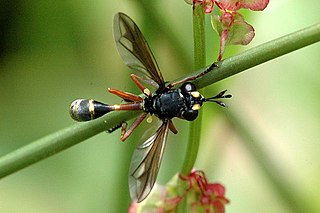
Physocephala rufipes is a species of fly from the genus Physocephala in the family Conopidae. Their larvae are endoparasites of bumble bees of the genus Bombus. It is common throughout much of Europe.
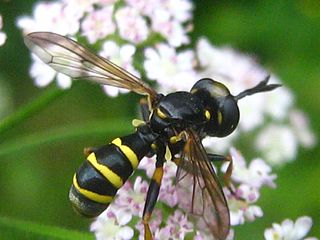
Conops flavipes is a species of fly from the genus Conops in the family Conopidae. Their larvae are endoparasites of bumble bees of the genus Bombus. It is common throughout much of Europe.

Myopa buccata is a species of fly from the genus Myopa in the family Conopidae. Their larvae are endoparasites of bumble bees of the genus Bombus. It is common throughout much of Europe.

Sicus is a genus of flies from the family Conopidae.

Physocephala is a genus of flies from the family Conopidae.

Zodion is a large genus of flies from the family Conopidae.
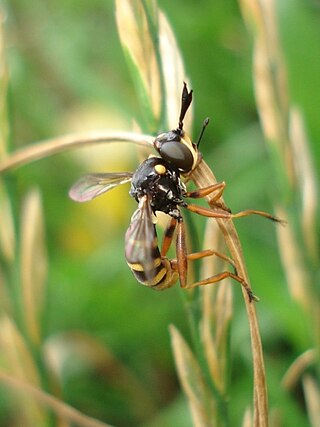
Conops ceriaeformis is a species of fly from the genus Conops in the family Conopidae. Their larvae are endoparasites of bees and wasps. The fly is scarce in the United Kingdom.

Physocephalini is a tribe of fly from the family Conopidae.

Conopinae is a subfamily of flies from the family Conopidae.

Leopoldius signatus is a species of fly from the genus Leopoldius in the family Conopidae.
Sicus abdominalis is a species of fly from the genus Sicus in the family Conopidae.

Physocephala sagittaria is a species of thick-headed fly in the family Conopidae. Larvae develop and pupate within the bodies of Bombus auricomus bees.
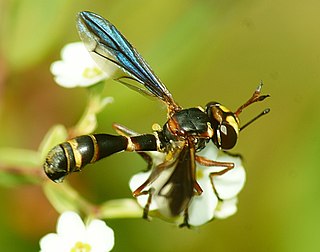
Physocephala marginata is a species of thick-headed fly in the family Conopidae. It is a parasite of Anthophora abrupta bees, although pupation occurs only after death of the host bee.

Physocephala tibialis is a species of thick-headed fly found throughout the eastern United States, often near flowering plants. The adult fly is primarily black with a yellow face and thin white stripes on the abdomen. It is commonly found along the east coast of the United States and is often found near flowering plants.
Physocephala texana is a species of thick-headed fly in the family Conopidae.
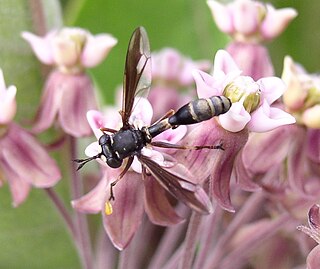
Physocephala furcillata is a species of thick-headed fly in the family Conopidae.
Physocephala floridana is a species of thick-headed fly in the family Conopidae.














